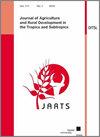Gender differences in time-poverty among rural households in Southwest Nigeria
Q3 Social Sciences
Journal of Agriculture and Rural Development in the Tropics and Subtropics
Pub Date : 2021-10-29
DOI:10.17170/KOBRA-202107134323
引用次数: 2
Abstract
This study seeks to assess gender inequality in and correlates of time poverty among 360 rural households in Southwest, Nigeria. A person is deemed to be time poor if (s)he works more than 10.5 hours per day, the internationally accepted threshold. Using the time allocation domain of the Abbreviated Women’s Empowerment in Agriculture Index, the study found that on the average, rural women and men spent about 10.3 hours and 8 hours, respectively, on work activities on a daily basis. Work activities for women were found to be diverse, spreading across reproductive and productive domains largely farming, own business e. g. trading, cooking and domestic work, while for men, work activities centred on productive economic activities, dominated by farming. Using a Probit regression model, the study found experience in agriculture and adoption of television to reduce the likelihood of time poverty among rural men. Surprisingly, participation in empowerment projects was found to increase the likelihood of time poverty among rural women. In conclusion, empowerment programmes should be expanded to address the non-material aspects of human well-being. Hence, the study recommends a gender-sensitive approach to intervention programmes in agriculture and adoption of a broader definition of empowerment which not only focus on expanding access to markets and increasing income but enhances control over time. This is more important for women who are already under the double burden of paid and unpaid domestic work.尼日利亚西南部农村家庭时间贫困的性别差异
本研究旨在评估尼日利亚西南部360个农村家庭的性别不平等及其与时间贫困的相关性。如果一个人每天工作超过10.5小时,即国际公认的阈值,则被视为时间贫乏。利用缩略妇女农业赋权指数的时间分配域,该研究发现,农村妇女和男子平均每天分别花在工作活动上的时间约为10.3小时和8小时。妇女的工作活动是多种多样的,分布在生殖和生产领域,主要是农业、自己的生意,如贸易、烹饪和家务劳动,而男子的工作活动以农业为主,以生产经济活动为中心。使用Probit回归模型,研究发现农业经验和电视的采用减少了农村男性时间贫困的可能性。令人惊讶的是,参与赋权项目增加了农村妇女时间贫困的可能性。最后,应扩大授权方案,以处理人类福利的非物质方面。因此,该研究建议对农业干预方案采取对性别问题敏感的做法,并采用更广泛的赋权定义,不仅注重扩大进入市场的机会和增加收入,而且随着时间的推移加强控制。这对已经承受有偿和无偿家务双重负担的妇女来说更为重要。
本文章由计算机程序翻译,如有差异,请以英文原文为准。
求助全文
约1分钟内获得全文
求助全文
来源期刊
CiteScore
2.30
自引率
0.00%
发文量
0
审稿时长
>36 weeks
期刊介绍:
The Journal of Agriculture and Rural Development in the Tropics and Subtropics publishes papers dealing with original research and review papers in the fields of plant production, animal nutrition and animal husbandry, soil science, rural economy and farm management, forestry and forest economy, veterinary hygiene and protection against epidemics.

 求助内容:
求助内容: 应助结果提醒方式:
应助结果提醒方式:


